Related Research Articles
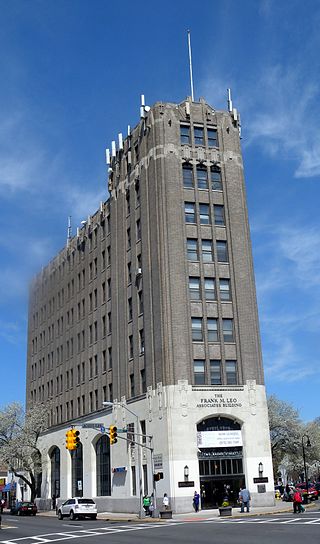
Bloomfield is a township in Essex County, in the U.S. state of New Jersey, and an inner-ring suburb of Newark. As of the 2020 United States census, the township's population was 53,105, an increase of 5,790 (+12.2%) from the 2010 census count of 47,315, which in turn reflected a decline of 368 (-0.8%) from the 47,683 counted in the 2000 census. It is the location of the Bloomfield Green Historic District, which was added to the National Register of Historic Places in 1978.

Cedar Grove is a township in north central Essex County, in the U.S. state of New Jersey. As of the 2020 United States census, the township's population was 12,980, an increase of 569 (+4.6%) from the 2010 census count of 12,411, which in turn reflected an increase of 111 (+0.9%) from the 12,300 counted in the 2000 census.
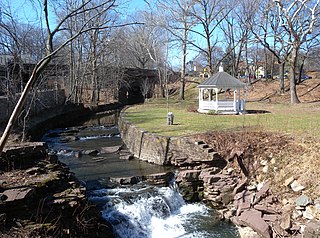
Glen Ridge is a borough in Essex County, in the U.S. state of New Jersey. As of the 2020 United States census, the borough's population was 7,802, an increase of 275 (+3.7%) from the 2010 census count of 7,527, which in turn reflected an increase of 256 (+3.5%) from the 7,271 counted in the 2000 census. The borough is notable for being one of a few in New Jersey preserving the use of gas lamps for street lighting.

Irvington is a township in Essex County, in the U.S. state of New Jersey. As of the 2020 United States census, the township's population was 61,176, an increase of 7,250 (+13.4%) from the 2010 census count of 53,926, which in turn reflected a decline of 6,769 (−11.2%) from the 60,695 counted in the 2000 census.

Montclair is a township in Essex County in the U.S. state of New Jersey. Situated on the cliffs of the Watchung Mountains, Montclair is a commercial and cultural hub of North Jersey and a diverse bedroom community of New York City within the New York metropolitan area. The township is the home of Montclair State University, the state's second-largest university.

Verona is a township in Essex County in the U.S. state of New Jersey. As of the 2020 United States census, the township's population was 14,572, an increase of 1,240 (+9.3%) from the 2010 census count of 13,332, which in turn reflected a decline of 201 (−1.5%) from the 13,533 counted in the 2000 census.

Jackson Township is a township in Ocean County, in the U.S. state of New Jersey. A portion of the township is located within the Pinelands National Reserve. As of the 2020 United States Census, the township's population was 58,544, an increase of 3,688 (+6.7%) from the 2010 census count of 54,856, which in turn reflected an increase of 12,040 (+28.1%) from the 42,816 counted in the 2000 census.

Little Falls is a township in Passaic County, in the U.S. state of New Jersey. The township was named after a waterfall on the Passaic River at a dam near Beattie Mill. As of the 2020 United States census, the township's population was 13,360, a decrease of 1,072 (−7.4%) from the 2010 census count of 14,432, which in turn reflected an increase of 3,577 (+33.0%) from the 10,855 counted in the 2000 census.

Livingston is a township in Essex County, in the U.S. state of New Jersey. As of the 2020 United States census, the township's population was 31,330, its highest decennial count ever and an increase of 1,964 (+6.7%) from 29,366 recorded at the 2010 census, which in turn reflected an increase of 1,975 (+7.2%) from the 27,391 counted in the 2000 census. In 2023, the Population Estimates Program by the United States Census Bureau calculated that the township had a population of 31,089.

Delta Phi (ΔΦ) is a fraternal society established in Schenectady, New York, on November 17, 1827. Its first chapter was founded at Union College, and was the third and final member of the Union Triad. In 1879, William Raimond Baird's American College Fraternities characterized the fraternity's membership as being largely drawn from the old Knickerbocker families of New York and New Jersey.
The Optional Municipal Charter Law or Faulkner Act provides New Jersey municipalities with a variety of models of local government. This legislation is called the Faulkner Act in honor of the late Bayard H. Faulkner, former mayor of Montclair, New Jersey, U.S., and former chairman of the Commission on Municipal Government.

Upper Montclair is a census-designated place (CDP), unincorporated community and neighborhood within Montclair in Essex County, in the U.S. state of New Jersey. As of the 2010 United States Census, the population for the CDP was 11,565. The area is served as United States Postal Service ZIP Code 07043. It is often misperceived, even by Montclair residents, to be a separate municipality from Montclair, perhaps aided by this postal designation.

Montclair Heights is a New Jersey Transit station in the Montclair Heights area of Montclair Township, New Jersey. Located along the Montclair-Boonton Line at the Normal Avenue (CR 618) grade crossing, the station serves trains coming from six different terminals. Depending on the direction of travel, Montclair Heights is either the first or last of six stations in the township. The next station westbound is Montclair State University, which is in Little Falls, while the next station eastbound is Upper Mountain Avenue.
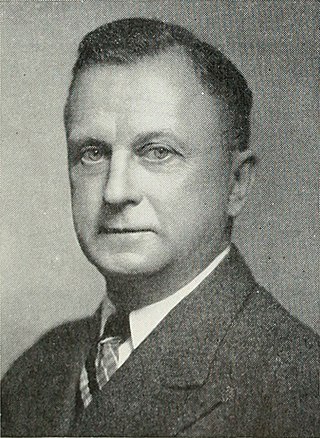
Harold Smith Osborne was an American electrical engineer. He worked for the American Telephone & Telegraph Company for forty years, leading the team that developed the system that enabled long-distance dialing. He was president of the Regional Plan Association and served as the mayor of Montclair, New Jersey.

Mary Veronica Kasser Mochary is an American attorney, philanthropist, farmer and politician who served as Mayor of Montclair, New Jersey between 1980 and 1984 for the Republican Party as well as Principal Deputy Legal Advisor at the United States Department of State. In 1984, she was the Republican nominee for United States Senate in 1984 to oppose incumbent Bill Bradley.

Ampere, formerly known as The Crescent, is a defunct stop on New Jersey Transit's Montclair-Boonton Line in the city of East Orange, Essex County, New Jersey, United States. A station was first built there in 1890 to service to new Crocker Wheeler plant in the district. The stop was named in honor of André-Marie Ampère, a pioneer in electrodynamics and reconstructed as a new Renaissance Revival station in 1908. Ampere was the second stop on the branch west of Newark Broad Street Station until 1984, when the Roseville Avenue station was closed. In June of that year, the station, along with 42 others, was entered into the National Register of Historic Places. In 1986, after continuous deterioration, New Jersey Transit demolished the westbound shelter built in 1921. The agency discontinued rail service to Ampere on April 7, 1991. The entire station was demolished in 1995.
Frank Fellows Gray, also known as Uncle, was a pioneer of Scouting in America, teacher and musician. He was a personal friend of Robert Baden-Powell, 1st Baron Baden-Powell founder of the Scout Movement who on a visit to Montclair, New Jersey on February 2, 1912 bestowed the singular honor of "The Baden-Powell Troop" on Frank's Boy Scout Troop 4.
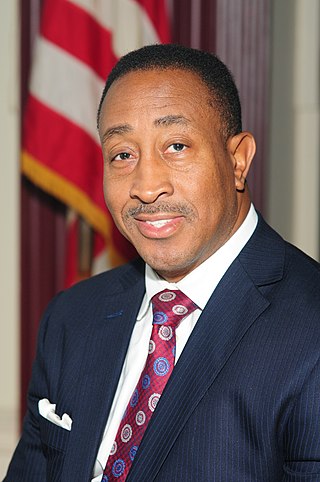
East Orange, New Jersey is governed under the City form of New Jersey municipal government. The government consists of a mayor and a city council made up of ten members, two representing each of the city's five geographic political subdivisions called wards. The mayor is elected directly by the voters. The ten members of the city council are elected to four-year terms on a staggered basis, with one seat in each ward coming up for election every other year.
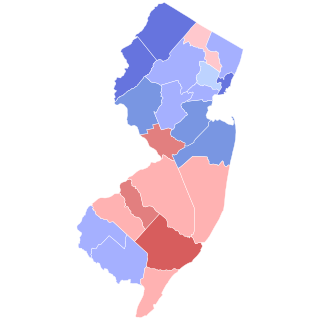
The 1913 New Jersey gubernatorial election was held on November 4, 1913. Democratic acting Governor James Fairman Fielder, who resigned a week before the election so that he could succeed himself, defeated Republican former Governor Edward C. Stokes and Progressive former state senator Everett Colby.

The 1984 United States Senate election in New Jersey was held on November 6, 1984. Incumbent Democrat Bill Bradley defeated Republican nominee Mary V. Mochary with 64.16% of the vote, winning every county in the state. To date, this is the most recent time Hunterdon, Sussex, and Warren counties were won by a Democrat in a statewide election. This was also the last time Morris County voted Democratic in a statewide election until 2020, where Senator Cory Booker won the county in his reelection and Joe Biden won the county in the 2020 presidential race.
References
- ↑ Delta Phi catalogue, 1827-1907. Delta Phi. 1907.
- ↑ Manual of the Legislature of New Jersey. p. 417.
- ↑ "New Montclair Board Organizes Next Week". New York Times . May 10, 1928. Retrieved 2011-10-13.
- ↑ "Harold Osborne, Chief Of A.T.&T. Engineers". The New York Times. 1986-01-02. ISSN 0362-4331 . Retrieved 2023-02-26.
- ↑ "Mostly White Newark Suburb Gets Negro Mayor". Jet magazine. June 6, 1968.
- ↑ "Commission, School Board Top Changes in 1976". The Montclair Times. December 29, 1976.
- ↑ "New Jersey Senate Campaign: Two Profiles in Determination". New York Times . October 31, 1984. Retrieved 2011-10-14.